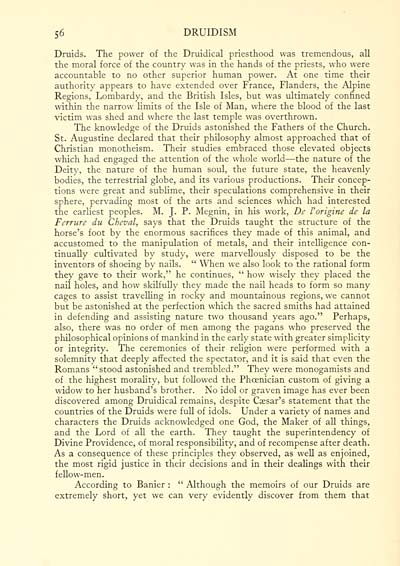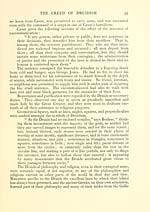Ossian Collection > Druidism
(78)
Download files
Complete book:
Individual page:
Thumbnail gallery: Grid view | List view

56 DRUIDISM
Druids. The power of the Druidical priesthood was tremendous, all
the moral force of the country was in the hands of the priests, who were
accountable to no other superior human power. At one time their
authority appears to have extended over France, Flanders, the Alpine
Regions, Lombardy, and the British Isles, but was ultimately confined
within the narrow Umits of the Isle of Man, where the blood of the last
victim was shed and where the last temple was overthrown.
The knowledge of the Druids astonished the Fathers of the Church.
St. Augustine declared that their philosophy almost approached that of
Christian monotheism. Their studies embraced those elevated objects
which had engaged the attention of the whole world — the nature of the
Deity, the nature of the human soul, the future state, the heavenly
bodies, the terrestrial globe, and its various productions. Their concep-
tions were great and sublime, their speculations comprehensive in their
sphere, pervading most of the arts and sciences which had interested
the earliest peoples. M. J. P. Megnin, in his work, De Porigine de la
Ferrure du Cheval, says that the Druids taught the structure of the
horse's foot by the enormous sacrifices they made of this animal, and
accustomed to the manipulation of metals, and their intelligence con-
tinually cultivated by study, were marvellously disposed to be the
inventors of shoeing by nails. " VVhen we also look to the rational form
they gave to their work," he continues, " how wisely they placed the
nail holes, and how skilfully they made the nail heads to form so many
cages to assist travelling in rocky and mountainous regions, we cannot
but be astonished at the perfection which the sacred smiths had attained
in defending and assisting nature two thousand years ago." Perhaps,
also, there was no order of men among the pagans who preserved the
philosophical opinions of mankind in the early state with greater simplicity
or integrity. The ceremonies of their religion were performed with a
solemnity that deeply affected the spectator, and it is said that even the
Romans "stood astonished and trembled." They were monogamists and
of the highest moraHty, but followed the Phoenician custom of giving a
widow to her husband's brother. No idol or graven image has ever been
discovered among Druidical remains, despite Caesar's statement that the
countries of the Druids were fuU of idols. Under a variety of names and
characters the Druids acknowledged one God, the Maker of all things,
and the Lord of all the earth. They taught the superintendency of
Divine Providence, of moral responsibility, and of recompense after death.
As a consequence of these principles they observed, as well as enjoined,
the most rigid justice in their decisions and in their dealings with their
fellow-men.
According to Banier : " Although the memoirs of our Druids are
extremely short, yet we can very evidently discover from them that
Druids. The power of the Druidical priesthood was tremendous, all
the moral force of the country was in the hands of the priests, who were
accountable to no other superior human power. At one time their
authority appears to have extended over France, Flanders, the Alpine
Regions, Lombardy, and the British Isles, but was ultimately confined
within the narrow Umits of the Isle of Man, where the blood of the last
victim was shed and where the last temple was overthrown.
The knowledge of the Druids astonished the Fathers of the Church.
St. Augustine declared that their philosophy almost approached that of
Christian monotheism. Their studies embraced those elevated objects
which had engaged the attention of the whole world — the nature of the
Deity, the nature of the human soul, the future state, the heavenly
bodies, the terrestrial globe, and its various productions. Their concep-
tions were great and sublime, their speculations comprehensive in their
sphere, pervading most of the arts and sciences which had interested
the earliest peoples. M. J. P. Megnin, in his work, De Porigine de la
Ferrure du Cheval, says that the Druids taught the structure of the
horse's foot by the enormous sacrifices they made of this animal, and
accustomed to the manipulation of metals, and their intelligence con-
tinually cultivated by study, were marvellously disposed to be the
inventors of shoeing by nails. " VVhen we also look to the rational form
they gave to their work," he continues, " how wisely they placed the
nail holes, and how skilfully they made the nail heads to form so many
cages to assist travelling in rocky and mountainous regions, we cannot
but be astonished at the perfection which the sacred smiths had attained
in defending and assisting nature two thousand years ago." Perhaps,
also, there was no order of men among the pagans who preserved the
philosophical opinions of mankind in the early state with greater simplicity
or integrity. The ceremonies of their religion were performed with a
solemnity that deeply affected the spectator, and it is said that even the
Romans "stood astonished and trembled." They were monogamists and
of the highest moraHty, but followed the Phoenician custom of giving a
widow to her husband's brother. No idol or graven image has ever been
discovered among Druidical remains, despite Caesar's statement that the
countries of the Druids were fuU of idols. Under a variety of names and
characters the Druids acknowledged one God, the Maker of all things,
and the Lord of all the earth. They taught the superintendency of
Divine Providence, of moral responsibility, and of recompense after death.
As a consequence of these principles they observed, as well as enjoined,
the most rigid justice in their decisions and in their dealings with their
fellow-men.
According to Banier : " Although the memoirs of our Druids are
extremely short, yet we can very evidently discover from them that
Set display mode to: Large image | Transcription
Images and transcriptions on this page, including medium image downloads, may be used under the Creative Commons Attribution 4.0 International Licence unless otherwise stated. ![]()
| Early Gaelic Book Collections > Ossian Collection > Druidism > (78) |
|---|
| Permanent URL | https://digital.nls.uk/78950412 |
|---|
| Description | Selected books from the Ossian Collection of 327 volumes, originally assembled by J. Norman Methven of Perth. Different editions and translations of James MacPherson's epic poem 'Ossian', some with a map of the 'Kingdom of Connor'. Also secondary material relating to Ossianic poetry and the Ossian controversy. |
|---|
| Description | Selected items from five 'Special and Named Printed Collections'. Includes books in Gaelic and other Celtic languages, works about the Gaels, their languages, literature, culture and history. |
|---|

